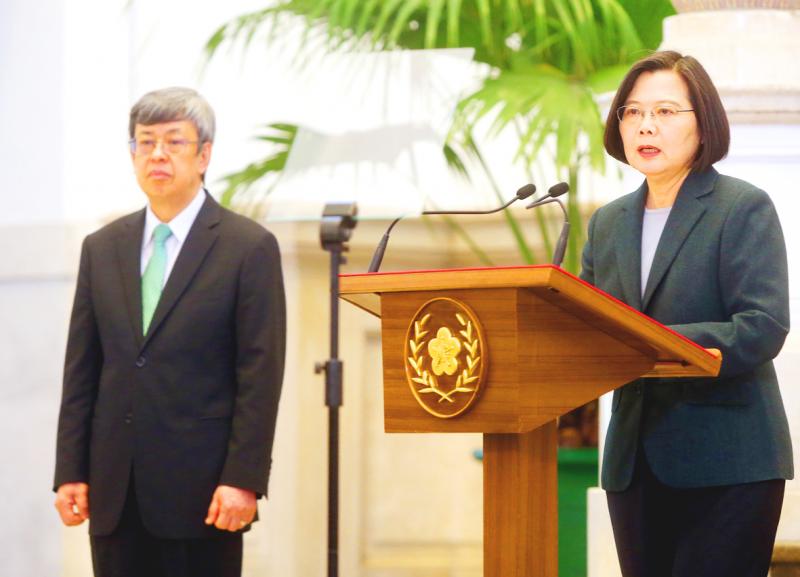Amid doubts caused by the relatively low number of COVID-19 tests conducted in Taiwan, Vice President Chen Chien-jen (陳建仁) has defended the nation’s practices, saying that large volumes of tests are only needed when sources of infection cannot be traced.
As of Wednesday last week, Taiwan had conducted 20,014 tests for the novel coronavirus, compared with 307,024 by South Korea, raising questions over whether Taiwan’s testing has been aggressive enough.
Minister of Health and Welfare Chen Shih-chung (陳時中), who heads the Central Epidemic Command Center, on Saturday last week rejected a call to conduct more COVID-19 testing, as many people have requested to be tested at their own expense.

Photo: CNA
He said that such a practice could increase the number of false negative results.
More testing “might not only not help efforts to stem the outbreak, it could even create a quarantine loophole,” Chen Shih-chung said, adding that those with false negative results could move about without taking precautions, thinking that they are free of the virus, while infecting others.
Chen Chien-jen, an epidemiologist by training, on Monday said on Facebook that the prevalence of the novel coronavirus in Taiwan is less than one per 100,000 people, and that “only a few cases have unknown sources.”
As such, the government has concentrated its testing on those who have come in contact with infected patients and those categorized as highly vulnerable to COVID-19, he said.
“Such a practice guarantees that the tests are proper and efficient, and in line with cost-benefit principles,” the vice president said.
In addition, he provided data from 13 nations that have conducted at least 15,000 tests on their volume of testing, the number of positive cases found and the prevalence of the disease in their populations.
The figures generally showed that “the lower the rate of positive tests, the broader the coverage of tests of potentially infected people,” Chen Chien-jen.
Of the 13 nations, Taiwan had five positive results for every 1,000 tests conducted, trailing only the United Arab Emirates at 0.8 positive results per 1,000 tests and Russia with 1.2 positive results per 1,000 tests, he said.
Taiwan had 0.45 infections per 100,000 people, the second-lowest ratio after Russia’s 0.14 infections per 100,000, he added.
However, Chen Chien-jen acknowledged that the correlation between positive test rates and infection rates per 100,000 people was not absolute, citing statistics from France, Belgium and South Korea, where there were about 16 infections per 100,000 people, but their positive test rates varied greatly.
While South Korea saw 27.9 positive results per 1,000 tests, Belgium reported 80.9 positive results per 1,000 tests and France 167.4 positives per 1,000 tests.
The figures suggest that South Korea and Belgium conducted more tests on people who were not infected, while France tested more people who were infected, Chen Chien-jen said.
The center said that COVID-19 tests are being conducted on “high-risk” subjects, divided into two groups: those who have come in contact with foreigners who had respiratory symptoms and a fever; and people with pneumonia or who have a fever and respiratory symptoms after returning from countries for which the highest level of travel advisory has been issued.

Taiwan is stepping up plans to create self-sufficient supply chains for combat drones and increase foreign orders from the US to counter China’s numerical superiority, a defense official said on Saturday. Commenting on condition of anonymity, the official said the nation’s armed forces are in agreement with US Admiral Samuel Paparo’s assessment that Taiwan’s military must be prepared to turn the nation’s waters into a “hellscape” for the Chinese People’s Liberation Army (PLA). Paparo, the commander of the US Indo-Pacific Command, reiterated the concept during a Congressional hearing in Washington on Wednesday. He first coined the term in a security conference last

Prosecutors today declined to say who was questioned regarding alleged forgery on petitions to recall Democratic Progressive Party (DPP) legislators, after Chinese-language media earlier reported that members of the Chinese Nationalist Party (KMT) Youth League were brought in for questioning. The Ministry of Justice Investigation Bureau confirmed that two people had been questioned, but did not disclose any further information about the ongoing investigation. KMT Youth League members Lee Hsiao-liang (李孝亮) and Liu Szu-yin (劉思吟) — who are leading the effort to recall DPP caucus chief executive Rosalia Wu (吳思瑤) and Legislator Wu Pei-yi (吳沛憶) — both posted on Facebook saying: “I

A court has approved Kaohsiung prosecutors’ request that two people working for Democratic Progressive Party (DPP) Legislator Lin Dai-hua (林岱樺) be detained, as a probe into two cases allegedly involving her continues. The request was made on Friday, after prosecutors raided Lin’s two offices and the staffers’ residences, and questioned five on suspicion of contravening the Anti-Corruption Act (貪汙治罪條例). The people included the directors of Lin’s Daliao (大寮) and Linyuan (林園) district offices in Kaohsiung, surnamed Chou (周) and Lin (林) respectively, as well as three other staffers. The prosecutors’ move came after they interrogated Lin Dai-hua on Wednesday. She appeared solemn following

Sung Chien-liang (宋建樑), who led efforts to recall Democratic Progressive Party (DPP) Legislator Lee Kun-cheng (李坤城), was released on bail of NT$80,000 today amid outcry over his decision to wear a Nazi armband to questioning the night before. Sung arrived at the New Taipei District Prosecutors’ Office for questioning in a recall petition forgery case last night wearing a red armband bearing a swastika, carrying a copy of Adolf Hitler’s Mein Kampf and giving a Nazi salute. Sung left the building at 1:15am without the armband and covering the book with his coat. Lee said today that this is a serious